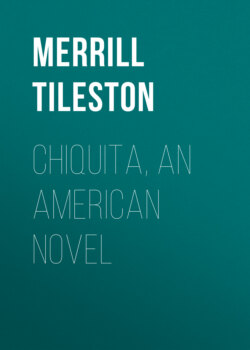Читать книгу Chiquita, an American Novel - Merrill Tileston - Страница 9
На сайте Литреса книга снята с продажи.
CATS, TRAPS, AND INDIANS.
ОглавлениеThe steady life of a trapper had become regular diet to Jack, as day after day he visited old traps, set out new ones and explored territory farther away from the cabin. The Indians were daily visitors whether he was in camp or not, but they never molested anything, no matter how curious or hungry. They were seemingly good humored, even though there appeared an undercurrent of dissatisfaction. The first episode to put him on his guard was when one of the Utes, Bennett, hid behind a tree near the camp fire outside the cabin. Yamanatz was there in his customary place, squatted upon the ground. A strange dog ran in and out of the place and Jack inquired of the old Ute how the dog happened to be there. Yamanatz, unconcerned, replied, "Me dunno." This puzzled Jack, but he went about his cooking, carefully watching the trees and rocks. He felt for the first time a species of alarm. Again he inquired, "Ute dog, mebbe so?"
"Me dunno."
Jack knew no white man would go along that trail at that time of year without stopping to say "How!" In fact, there was no white man within forty miles, except old Joe Riggs, and old Joe would be there with the dog if the dog was Joe's. The suspense had a sudden termination as the muzzle of a rifle "mirrored" in the sunlight, just the tip of the muzzle being thus accidentally disclosed. Quick as a flash Jack pulled his six shooter, cocked it and held it level at the tree where the bright steel was in full view. Yamanatz made neither sign nor comment, but Jack felt that the cunning old chief was fully aware of all that was going on. Very soon the edge of a woolen turban cap appeared opposite the rifle muzzle, then an ear, then a little of the chin and finally the eye of Bennett looked straight into Jack's six shooter. With a bound the joker jumped from behind the tree and, with a laugh which could have been heard a mile, and in which Yamanatz joined, came forward, palms outward, signifying peace, exclaiming, "White man no 'fraid; heap big joke, heap big joke."
But Jack began to feel that these jokes might end in something serious, especially if he showed the white feather in the least.
The next day he returned from the traps just as the last streaks of sunlight were tipping the tops of the cañon where Rock Creek dashed by the cabin. Yamanatz sat by the cold camp fire in the same place and same position in which Jack had left him after breakfast, six hours before. Of course, Jack was surprised at this and wondered what it meant. As Jack swung into the open space Yamanatz immediately arose with hands outstretched, the palms well up towards the comer, accompanying the action with this eager outburst:
"Yamanatz heap glad to see white man Jack; Colorow come. White man gone. Colorow heap mad, want to see white man. Me tell 'em white man gone, Colorow follow white man; byme by Antelope come look for Colorow; Antelope go back Indian village by Pony Creek. Antelope tell Utes Colorow mean mischief; Colorow's boy come byme by look for Colorow; when Yamanatz tell Colorow's boy 'Colorow follow white man,' Colorow's boy heap 'fraid, say: 'Mebbe so Colorow meet 'em white man Jack.' Then Colorow's boy go Indian village. Sun low—Chiquita come, no find white man, go back Indian village, mebbe so white man see Colorow?"
Jack, of course, was nervous. Alone in a wild country that was alive with wild game, ravenous wolves, mountain lions, bears and hostile Indians, he realized what a novice, a tenderfoot, a fool he was, or would be, to put his ignorance of frontier life against the cunning of the old chiefs, but he answered quickly,
